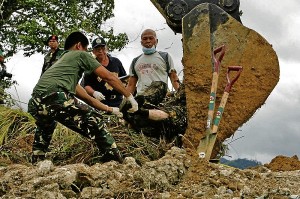MANILA, Philippines – Hired assassins are stalking witnesses to the Maguindanao massacre in which a political warlord allegedly led the slaughter of 57 people, victims’ relatives and a rights group said almost two years into a complex trial.
Three witnesses and three relatives of others who planned to testify have been killed in what locals regard as chilling messages for anyone speaking out against the politician and other clan members on trial for the massacre.
At least 10 witnesses have been placed under the justice department’s protection in a secret location, according to Esmael Mangudadatu, a rival politician whose wife and two sisters died in the massacre.
But he said many others were on their own in a dangerous game of cat and mouse with the hitmen.
“Their lives are at risk every day,” Mangudadatu said.
“They are being hunted down by hired gunmen and sooner or later there will be more killings.”
Mangudadatu himself is protected by burly security guards as he shuffles every week between Manila, where court proceedings are being held, and Maguindanao, the southern province where the killings occurred.
“I cannot move freely, it’s that dangerous,” he told AFP.
The massacre in 2009 was allegedly orchestrated by the Ampatuan clan in a bid to stop Mangudadatu from challenging one of its members for the post of governor in Maguindanao, a farming province in the southern island of Mindanao.
Mangudadatu’s rival, Andal Ampatuan Jr, allegedly led his family’s private army in stopping a convoy carrying his foe’s wife, relatives, lawyers and a group of 32 journalists, and then gunning them down on a grassy hill.
The bodies were found almost immediately afterwards, in roadside pits dug using a government-owned mechanical digger.
The Ampatuans had ruled Maguindanao for about a decade under the patronage of then-president and now Pampanga Representative Gloria Macapagal-Arroyo, who had used the clan’s militias as a buffer against Muslim separatist rebels.
Maguindanao and other parts of Mindanao are the traditional homelands of the Philippines’ Muslim minority.
Some Muslims have been waging a separatist rebellion for decades, while others, such as the Mangudadatu and Ampatuan clans, have chosen to be a part of the national political system.
Mindanao politics has long seen murders and intimidation between rival clans, although the Maguindanao massacre was the worst act of violence.
Ampatuan Jnr, his father and other members of the clan are among 197 people charged over the murders, with Ampatuan Jnr the first to go on trial in September 2010.
But about 100 of those charged – mostly members of the Ampatuan private militia – remain at large, while other clan figures still hold local government posts.
Those who have been detained, including the senior Ampatuans, are in Manila while on trial or awaiting trial.
Hearings are held just once a week and lawyers expect proceedings to drag on for years or even decades in the Philippines’ backlogged justice system. Prosecutors have complained of delaying tactics by the defence.
At least 20 witnesses, including former Ampatuan aides, have directly linked clan members to the killings, and many more have expressed a willingness to do the same but are being threatened, prosecutors have said.
Mangudadatu eventually became governor of Maguindanao, but he has not held office in the provincial capital for fear of being ambushed.
Catherine Nunez, 50, whose son Victor was among the journalists killed, also said relatives of the victims were being harassed.
“Maybe they want us to drop the case. I am afraid if no help arrives soon, they may harm my two other children,” Nunez told AFP by phone.
Among those slain was Esmail Amil Enog, a former employee of the Ampatuans who had testified in court that he drove the clan’s gunmen to the site of the massacre.
He went missing in March after flying home to Maguindanao and his dismembered body was later found by police stuffed into a sack.
Enog’s boss, a clan member who had told prosecutors he wanted to turn state witness, was also shot dead this year, while another militia member met the same fate in 2010.
The relatives of three other witnesses were also killed, according to prosecutors.
Such cases have been monitored by the New York-based Human Rights Watch (HRW), which has repeatedly called on President Benigno Aquino to do more to protect the witnesses and their relatives.
“The fear is very real,” said Carlos Conde, HRW’s Philippine researcher.
The Ampatuan clan leaders have repeatedly denied carrying out the massacre.
Their lawyers have also previously denied that their clients still have a private army, and insisted they could not have ordered the killings of witnesses from behind bars.


